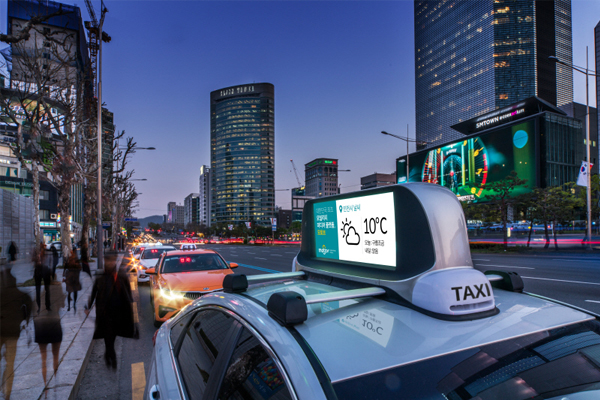PR/IR
News
News
News
- Date
- 2021.08.25 00:00
Urbantech startups are flourishing in Korea as they leverage on the lifestyle trends of seeking simpler, convenient, and safer urban life. Mobile media platform operator Motov envisions contributing to smart cities through its fleet of taxis with digital top that can display ads as well as store data while on the move.
With 32 Internet of Things-applied sensors, the tax roof display collects real-time data efficiently on disaster situation,
surrounding environment, current weather and traffic situation and measures floating population and the brightness of alley to monitor the accessibility of the drive. Approximately 5 billion units of data have been collected every month.
Motov currently is partnering with the city of Incheon to carry out a project to strengthen the night patrol in the high-accident areas.
MaaS Asia is building smart mobility capabilities for smart city scheme based on big data collected through the operation of its electric scooter-sharing service Alpaca. As a regulatory sandbox case, it has been testing out the Alpaca service using telco giant KT’s big data related to floating population, weather information and drive records in Sejong city. Its electric scooter automatically limits the top speed to below 10 km/h in the children protection zone.
Smart farm is another testbed for urbantech startups.
N.thing is an agri-food tech company that is leading innovation to agricultural products and the farm-to-table food value chain by combining IoT technology with data. It has developed the modular vertical farm CUBE and successfully won an export contract from Abu Dhabi, the United Arab Emirates.
“Our modularized farm has improved the productivity of fresh vegetables by 40 to 100 times, compared to traditional farms. We’ll keep up efforts to produce high-quality foods with our smart farm in urban cities for direct supply to consumers for sustainable growth,” said Hyeyeon Leo Kim, CEO of N.thing.
Recycling startup SuperBin has developed a reverse bending machine dubbed Nephron, which takes plastic bottles and aluminum cans and rewards points exchangeable into cash based on artificial intelligence technology. It was named as the business partner to test the smart waste machine in a smart village in Busan in October last year.
Barrier-free kiosk developer Dot is envisioning a smart city without discrimination. Its kiosk solutions suggest barrier-free design and accessibility to everyone, with support of tactile (touchable) graphic display, audio and sign language guide, subtitles for those with limited visual and/or auditory perceptions.
Dot kiosks have been installed at Seomyeon and Busan stations in the southern coastal city of Busan.
“We’re aiming to provide equal information on location, place and space to everyone,” said Kim Ju-yoon, CEO of Dot.
By Lee Sang-duk and Lee Ha-yeon


 Prev
Prev
 Next
Next









